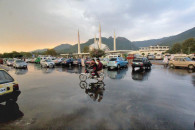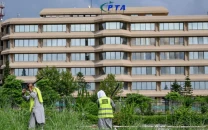Pakistan’s biggest internal security threat
Water scarcity has the potential to disrupt lifestyles of people from all walks of life

In 2019, Cape Town faced a grave water shortage as at least four million people stood in huge queues surrounded by armed guards to collect rations of fresh drinking water. Booming populations and extreme droughts exacerbated by climate change brought the South African port city to the brink of a situation locally called ‘zero water’. What is imperative to point out is the similarity between Cape Town and many of Pakistan’s heavily populated areas.
Pakistan, already gripped by economic and political instability, is trying to recover from the adverse effects of Covid-19. But as all focus has been on coping with the immediate effects of the pandemic, the next big crisis is already looming large. Our freshwater resources are shrinking at an unprecedented scale. Rising sea levels, disappearing glaciers, contaminated ground water and chronic droughts are all clear signs of our water crisis.
Like any acute stressor, the Covid-19 crisis has acted as a multiplier of chronic, pre-existing vulnerabilities, including water insecurity. Even before the pandemic unleashed its disastrous potential, Pakistan’s per capita water availability had dropped from 5060 cubic meters per annum in 1951 to only 908 cubic meters in 2019. The World Bank stresses countries to have a water threshold of at least 1000 cubic meters.
In Pakistan, river flows heavily depend on glacial melt. But with global warming breaking all previous records and heatwaves becoming more frequent, the Hindu Kush Assessment Report (2018) states that around 33% glaciers will melt by 2100 — around 14,000 glaciers on average. Ice loss of this magnitude will have grave consequences for millions in the country, resulting in worsening food insecurity, irreparable economic losses and intensified natural disasters.
Instead of empowering coordinated and collaborative forums, where a representative of each province has a seat, the PTI government failed to call Council of Common Interests meetings to discuss Pakistan’s looming water crisis, or even hear the grievances of Sindh and Balochistan, where water supplies have been cut by Indus River System Authority. Recently, Sindh, long deprived of its due share of water as per the Water Apportionment Act (1991), was left with only 10 days of water supplies.
The Indus Delta, the lifeline of local communities residing near the coastal threat, is facing grave danger from two fronts. Firstly, accelerated climate change has caused sea levels to rise at an unprecedented rate. But at the same time, the construction of dams is also causing the delta to shrink further. As of now, more than 92% of the Indus Delta has disappeared, and fresh water no longer remains accessible for the local communities.
If Pakistan is to mainstream the idea of water conservation, it needs a new narrative — a robust, constructive narrative to unite the country to curb the rising water scarcity levels. We thus need to amplify our public awareness campaigns and introduce a water conservation perspective in our curriculums. Water conservation education starts from an early age. Governments and communities can educate the public and restrict water use, but ultimately it is the responsibility of individuals to use water wisely. For instance: by just turning off the tap while brushing teeth, we can save up to 8 gallons of water monthly. One reason why Cape Town managed to mitigate its acute water crisis was through a collective water conservation effort, where the people played a pivotal role in reducing daily water usage.
If a green recovery from the Covid-19 crisis is to be sustainable, we must do everything in our power to mitigate our intensifying water woes. Water scarcity has the potential to disrupt lifestyles of people from all walks of life, especially those in rural areas and climate-stress zones. In Pakistan, water is at the very core of socio-economic development, energy and food production, healthy eco-systems, and human survival itself. Every drop counts.
Published in The Express Tribune, September 25th, 2021.
Like Opinion & Editorial on Facebook, follow @ETOpEd on Twitter to receive all updates on all our daily pieces.













COMMENTS
Comments are moderated and generally will be posted if they are on-topic and not abusive.
For more information, please see our Comments FAQ